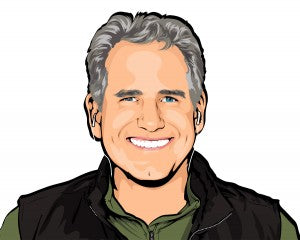
Part One: Our “Bozo Explosion” and How We Recovered
For the longest time when I was just starting out in business, I had a premise about people. I thought, ‘why do you need to wonder what makes people tick?’ It should be so simple. They take a job and get paid. Straightforward. I came to realize that I was completely wrong and this was a completely backwards way to think about people. As you grow with a business, you quickly learn you need more people to do things. It’s finding out how you select the best people for your business that is the hardest part.
I am believer in the “Bozo Explosion”, as Guy Kawasaki referred to in a post back in 2006, which I still reference today. The premise of this is that as soon as a company achieves success, they’ll hit a downward slide which can completely be avoided. It even happened at Apple under the control of Steve Jobs and it happened to us. Many things play a role in the downward spiral; the hiring of less than competent employees, involving big name consulting firms who have no interest in your business, money not well spent, and the list goes on. Well, here’s the short version of my ‘SCOTTEVEST Bozo Explosion’…

In 2010, our business began doubling year over year, and we were trying to adjust to some serious growing pains. People continued to tell me that as an entrepreneur, I needed to get out of the way and hire professional managers to run my business.
I was hesitant, but ended up hiring a President for an insane amount of money. It went back to my premise that if you pay someone a lot of money you’ll get a lot of value from them, which couldn’t have been further from the truth.
The hiring of a President failed miserably. In some cases the entrepreneur HAS to be the manager from my experience. I firmly believe there is an intrinsic value you can quantify because you are working with people who have similar work ethic, which ultimately leads to a more efficient working environment.
I initially should have said, ‘this is my job, this is my responsibility’. I can’t outsource that. SCOTTEVEST was, and still is, my company. No one will come in with a magic wand and create a team that is working towards a common goal without my vision.
This horrible hiring experience taught me some critical lessons and led me to re-evaluate my hiring process. Here they are:
1. Don’t judge a candidate by their resume
It is cliche, but you can’t judge a book by its cover and you can’t judge a candidate by their resume. A resume will always show the fluff and the good. I will immediately dismiss someone from the candidate pool if their resume contains typos, grammatical errors, or missing gaps. If their cover letter is generic or isn’t tailored to the specific job description they’re applying for, it will be disregarded. Thank yous are a requirement. No exceptions.
2. Test their follow up and thoroughness immediately
Following receipt of a resume, we will go a step further and create a communication cycle looking for the speed in which they reply to our emails and the completeness which they reply. If they are truly interested in the job, I can see a much more immediate reply.
3. Ask what THEY are looking for in this job
Two key questions that we ask all applicants when they’re applying for a job at SCOTTEVEST are their salary requirements and if they are willing to relocate to Sun Valley, ID. Without this information, it’s like going shopping for a car without a price range. I want to put the ball in their court and know what they need.
4. Use outside resources, tools and tests to get a better feel of the candidate
There will always be more to people than meets the eye and makes the resume. To truly identify these characteristics, we use a personal assessment tool called a DiSC profile. This test digs deep and helps us determine what personalities and characteristics will synergize in the workplace. Not only has this been extremely crucial in the hiring of management, but it has also helped in my own marriage. It explains a lot when I see features that I know would not work directly with me. My results might give you a better idea of how I operate:
My DiSC results summary:

We also use a web based system to monitor pre-employment tests called HireSelect, to measure a candidate’s aptitude with math, grammar, typing speed, and ability to multitask. These tests and systems have played an immense role in the hiring process at SCOTTEVEST and have helped us catch red flags before they become issues.
Ultimately what we’re looking for are real operators who can get things done. That leads me to the concept that people are puzzles and I’m constantly working to fit the right pieces together.
Part Two: People Are Puzzles
Have a look at the Careers page on our website. None of our jobs fit into a unique compartment. We want people who can figure it out and get it done. These are KEY elements to our corporate culture. SCOTTEVEST is a one of a kind environment where we are going to CREATE the best job for that candidate. That is how we solve the puzzle.

How do I know when a team is working well? The key is when people are happy. Be sensitive that these are people, and you can’t just say, “I’m paying you to work, so work!” I’ve learned that you need to treat employees gently and that’s what I’m struggling with. Unless they respect how the company is being led then they will not be happy and make people around us happy. If one person is unhappy, they’re going to make others unhappy. It’s a domino effect with people.
Being a CEO and working with people really challenges me to embody our corporate culture at the core, and figure it out. People are quite literally an everchanging, complicated puzzle. Your employees are your best resource and I know we’re the most successful when everyone feels a part of that team. They understand the grander goal, embody the corporate culture, and understand why it’s important and can rely on the people they’re working with. This couldn’t be further from the “bozo principle” I touched on earlier.
Laura, my wife and the President of the company, Thom, our Chief Implementation Officer, and myself have an incredible work dynamic that makes up our executive team. It hasn’t been easy, but we’ve learned how to operate as a well oiled machine. If you find it interesting and challenging to work with others, you will grow immensely in your position.There is no better gratification than watching employees grow in their role; those are the sorts of things that make me happy as a CEO.

At the core people need to be paid to meet their bills, but at the end of the day it’s about job satisfaction. Watching people feed off each other’s energy and creating a passion for a brand and company is the ultimate reward. When I close my eyes and look 20 years into my future, I imagine a lot of people working in functioning groups and building a brand that people want to be a part of. I’ve never felt closer than that as I do now, but never further away at the same time.
I care about being a great leader. If someone isn’t willing to believe or ‘drink the koolaid’ then I can’t make them. Its’ not sweetened with saccharin it’s sweetened with all natural ingredients. You can’t learn to be a great reader by reading a book or look at other’s success stories. You have to do it on your own. Anyone can talk the talk but walking the walk is different. It’s a pathway and I’m constantly falling, picking myself and others back up, learning and growing.
I’m outta here!


